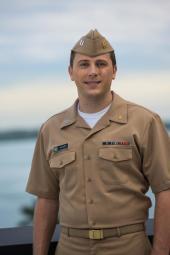-
About
- Departments & Offices
-
Academics
- Physician Assistant
- Special Master’s (MBS)
-
Admissions & Financial Aid
- Tuition & Fees
-
Student Experience
-
- Student Resources by Program
- Academic & Student Support
- Wellness & Wellbeing
- Student Life
- Events & Traditions
-
-
Research
- Research Labs & Centers
-
Local & Global Engagement
- Global Health Programs
- Community Engagement
Our Alumni: Andrew Klevos
"When I was working in the field...I discovered that it was the large public health programs that had the most significant impact."

My job is with the Centers for Disease Control and Prevention (CDC) in the Quarantine and Border Health Service Branch (QBHSB) under the Division of Global Migration and Quarantine (DGMQ). Throughout the US there are 20 CDC quarantine stations that are located at ports-of-entry throughout the country. I am currently serving as the Officer-in-Charge (OIC) for the Miami Quarantine Station that oversees the states of Florida, Alabama, and Mississippi. The mission of QBHSB is to protect global health security; so in my role I work to prevent the introduction of, and to mitigate the spread of infectious diseases that may arrive from foreign lands. When diseases such as Middle Eastern Respiratory Syndrome (MERS-CoV) arise my branch and division respond in many different ways to protect the public including conducting contact investigations, inspecting travelers and cargo, writing preparedness and response plans, creating and distributing public health messaging, and working with local and international partners to collaborate on activities to protect public health. I oversee these and other responsibilities for the CDC Miami Quarantine Station. The scope of my work is large and comprehensive!
What inspired you to pursue an MPH?
Having worked in clinical settings for nearly a decade before and during my undergraduate years, I had my heart set on pursuing medical school after graduating. But I also knew I needed to see what was out in the world before committing to such a big decision. So after I graduated I took a year to work in a rural clinic outside of Kathmandu, in an urban clinic treating street kids in Delhi, India, and in migrant worker slums in Goa, India. The impact of these experiences was life changing—personally and professionally, and my goals and aspirations shifted as I began to understand the real, critical need for public health programs. When I was working in the field I could deliver individualized health care, but I discovered that it was the large public health programs that had the most significant impact. I was able to organize multiple vaccination campaigns for slum families, educate kids on nutrition and first-aid, and help rural communities to vaccinate against polio. Experiencing that changed my perspective and ultimately my choice of professions from health care to public health. I also realized that to pursue public health I needed a firm understanding of population-based health care to succeed and make an impact.
What drew you to the Tufts Program?
After I returned from India I was very keen on obtaining an MPH with a concentration in global health. I also wanted an opportunity to conclude my program with an applied experience in the field, and the Tufts program met that need for me with its Applied Learning Experience (ALE). In addition, Tufts offered an incredibly strong academic environment, and I wanted to become a professional in that environment.
How did your Tufts degree help prepare you to work in the field (or what were the highlights of your Program)?
I credit Tufts’ Career Services for my getting into the CDC. They sent me a job posting for a Quarantine Public Health Officer/Advisor position in Boston, and I applied and was accepted. Tufts provided the avenue into my future profession, and because I was still in school at the time I accepted the position, I had the unique opportunity to apply freshly learned classroom skills directly to real world situations while on the job. Quite often I had to take emergency calls during class time, step out of lectures to manage real world emergencies, such as H1N1, and then go back to class!
What advice do you have for prospective students?
Anyone thinking of pursuing a masters degree is often driven with high professional or academic aspirations. And while the drive to fuel this is important, it’s equally important to stay flexible despite any pre-defined set of objectives you may have for yourself. Opportunities will certainly come your way, and although they might not fall into what you envision for yourself, consider pursuing them anyway, because therein lie opportunities to really kick-start your career.